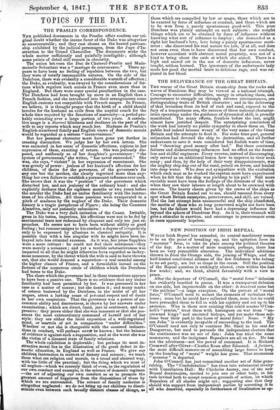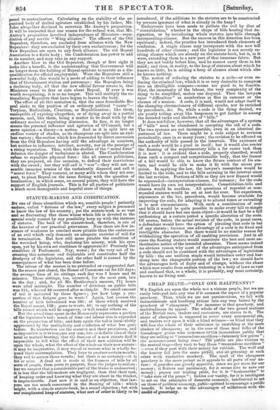NEW POSITION OF IRISH REPEAL.
WHILE Irish Repeal has extended, its central machinery seems to be on the point of breaking up, and the agitation loses its " monster " form, to take its place among the political theories of the day. As a matter of mere numbers, perhaps, there has been no very perceptible alteration. The individual additions thrown in from the Orange side, the joining of Whigs, and the half-hinted conditional alliance of the few Irishmen who belong to no set party, are but as drops in the ocean. Still the position of the Repeal question is strikingly altered, even within the last few weeks; and, we think, altered favourably With a view to peace.
After the departure of O'Connell, the "moral force" delusion has evidently tumbled to pieces. It was transparent delusion on one side, but impenetrable on the other: it deceived none but "the millions"—a large exception. On the pretext of " moral force," O'Connell used to collect the elements of turbulent vio- lence ; none but he could have collected them, none but he could have persuaded them to fall in with his cajolery and act up to his pretence. Who is there now existing that could muster O'Con- nell's " armies," treat them with harangues on war from "un- crowned kings" and anointed bishops, and yet make those mil- lions bear their part in the farce of moral force? None. " My son John" is evidently incapable of succeeding to the lead. The O'Connell used not only to continue Mr. Sheil in his seat for Dungarvan, but used to persuade the independent electors that the continuance was an act of fate: John has tried the same manoeuvre, and the indignant Repealers are all on fire. He has not the adroitness—not the power of command. It is Richard Cromwell after Oliver—Charles Kean after Edmund. Afortiori, the more difficult manmuvre of assembling large forces to keep up the humbug of "moral" weight has gone. That anomalous " monster " is departed. John O'Connell has just committed another act of false gene- ralship. The "Confederation" has risen into substantial rivalry with Conciliation Hall: Mr. Chisholm Anstey, one of the new Repeal doctrinaires, invited to join one or other body, in his turn invited both to accept common grounds of action, on which Repealers of all shades might act; suggesting also that they should win support from independent parties by according it to all who deserved, especially in furtherance of localization as op.
posed to centralization. Calculating on the stability of the or- ganized body of drilled agitators established by his father, Mr. John altogether declined to entertain Mr. Anstey's proposition. It will be suspected that one reason for the refusal was, that Mr. Anstey's proposition involved independence of Ministers—repu- diation of any servile " Whig alliance." The officers of the Old Repeaters, therefore, are excluded from alliance with the New Repeaters : they are excluded by their own exclusiveness; for the New Repeaters are open to any fresh alliance. The old Repeal Association is a finite body ; the Confederation has power to add to its number, and may take in any support.
Another blow to the Old Repeaters, though at first sight it looks like a benefit, is the understanding that Government will no longer deem the holding of Repeal opinions to operate as a dis- qualification for official employment. Were the Repeaters still a powerful body, this would be a mode of adding to their influence that of Government station and patronage: the Repeaters being a declining body, all that the new official favour means is, that Ministers cease to fear or care about Repeal. If ever it was worth recognizing, it is so no longer. This will multiply the ra- tionalizing Repeaters that have begun to leaven the body. The effect of all this mutation is, that the once formidable Re-
crly sinks to the position of an ordinary political "cause"- ism, Radicalism, Chartism, or Republicanism ; like them, susceptible of expiring altogether, or of dying away in a partial success, and, like them, being a matter to be dealt with by the ordinary modes of regulating discussion. In fine, it no longer means the personal influence and agitation of O'Connell, but a mere opinion—a theory—a notion. And as it is split into an endless variety of shades, so its champions are split into an end- less variety; the section which has descended by direct succession from the Old Repeaters having still the advantage in numbers, but neither in influence, intellect, novelty, nor in the prestige of a rising reputation. Thus, with the decline of the " moral force" "delusion the danger of turbulence is abated. The Confederation refuse to repudiate physical force : like all earnest politicians, they are prepared, on due occasion, to defend their convictions with the sword ; but they will call it "war"—they will not as- semble immense armies of the turbulently disposed and call it "moral force." They consent, or many svith whom they act con- sent, to place Repeal on the same footing with the question of localization ; in which sense, on several points, they will have the support of English journals. This is for all parties of politicians a much more manageable and hopeful state of things.



























 Previous page
Previous page